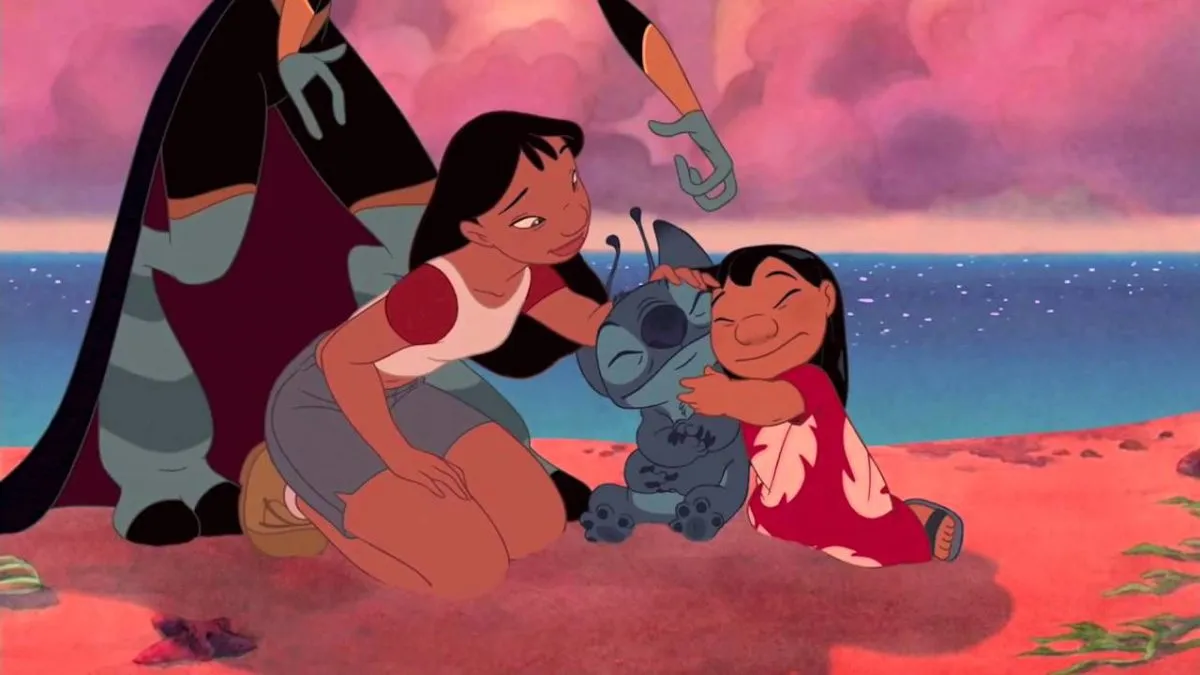If you weren’t on Twitter or Tumblr over the weekend, you may have missed the horrible take heard ’round the internet that got Lilo from Lilo & Stitch trending. Just when you think social justice language can’t get appropriated any harder by people in fandom trying to explain their hot takes, we get this fantastically terrible one that (a) calls Lilo a brat for reacting to trauma like a child, not an adult (b) whitesplains Native Hawaiian culture and (c) thinks that the moral of this movie should have been to abandon a six-year-old girl.
I’m only going to link to the initial Tweet, because I am only giving it attention to write this piece, and frankly, the more they explain their “rationale,” the worse their opinion seems.
Folks have been asking what @Kalei_Works and I meant in this drawing I did the other night, in our critique of Lilo & Stitch. So here’s the full reason as I posted it on Tumblr, best as I can explain! pic.twitter.com/uBfld1u0wv
— SquigglyDigg (@SquigglyDigg) April 6, 2020
The opinion basically boils down to the idea that Lilo is a violent “brat” whose actions amount to “abuse.” Many people, both Pasifika and others, have addressed this issue, and I don’t want to just make this post an assortment of their tweets, but as many of them bring up: Lilo is a six-year-old girl whose parents have just died suddenly in an accident. When we see her act with “violence” against her classmate, it’s because that girl literally just mocked her in reference to her parents’ death. That Karen deserved those hands. You don’t talk about people’s dead parents like that, and her comment is more “bratty” and “obnoxious” than Lilo’s emotional response.
What’s even more disturbing is a companion piece that sounds like a reverse-racism think piece and compares Lilo playing a prank on some white tourists to a rape. The writer also seems to think the movie takes place in the ’70s, because of Lilo and Nani’s home, but really, what they are seeing is systemic poverty:
The deleted scene where Lilo fakes a Tsunami warning to freak out tourists, and then justifies it because “white people bad” is a pretty disgusting take, and one of the best examples of projecting perceived 1970’s culture by the writers. The only people who would find that scene amusing are the ones who perpetuate the hatred and violence that still plagues parts of the islands, of which one incident involving the gang-rape of a Finnish tourist eventually led to the debate of criminal rape laws across the United States.
Quite frankly, if you think there could ever not be an “us vs. them” mentality for Native people who have been systematically abused by a white government for literal centuries (and let’s not forget how Hawaii was made a “state” in the first place), just because now white people can say “Look, y’all have a crumb of rights now,” it shows that you do not have the intellectual, emotional, or empathetic range to even begin to put thoughts together to critique characters of color.
They also reference something called “Kill Haole Day.” Haole is the term for a non-Native Hawaiian or Polynesian, and the day was a term made up to talk about incidents of alleged bullying of non-Native kids. However, there is very little firsthand evidence of these events actually happening, and also, it became a term that was brought up to paint events in an anti-Native light every time there was any kind of violent interaction between non-Natives and locals. You can find that out with a quick Google search.
We also get this charming line: “To write Lilo just like any other 6 year old brat, ignorantly happy to reign hell upon her sister’s life after their parents have died, and write Nani as an incapable mess of nerves unable to rise to the challenge of her newfound hardships for the sake of ‘realism’, is absolutely insulting for a movie allegedly meant to celebrate the Hawaiian people and their culture.”
Wow. Just … wow.
As someone who has a sister who is seventeen years my senior, she is my sister, not my mother. I cannot imagine what it would be like, as a teenager, to suddenly become responsible for taking care of your sister, going from sibling to parent—not for a weekend, not for a week, but for the next twelve years. Nani is afraid of losing her sister due to child services—which, if you know anything about how Native peoples have been treated by those kinds of organizations, you know that is not just fiction.
Children in media are a mixed bag. A lot of them are annoying in a precious way. A lot of times, children are written to actively throw a wrench into storylines, but that’s not Lilo. She’s someone who does not have the language to express herself and does so through the actions of a child, which means sometimes throwing a tantrum.
Lilo & Sitich is not a perfect movie, and there are plenty of thoughtful criticisms about it from Native Hawaiians, but this hateful, ignorant post is the kind of pop culture criticism that is so terrible that it actually poisons the well. When you can, with a straight face, call a six-year-old girl an abuser, as this post does, for not being perfect, then the word has no meaning.
(image: Disney)
Want more stories like this? Become a subscriber and support the site!
—The Mary Sue has a strict comment policy that forbids, but is not limited to, personal insults toward anyone, hate speech, and trolling.—










Published: Apr 13, 2020 02:44 pm